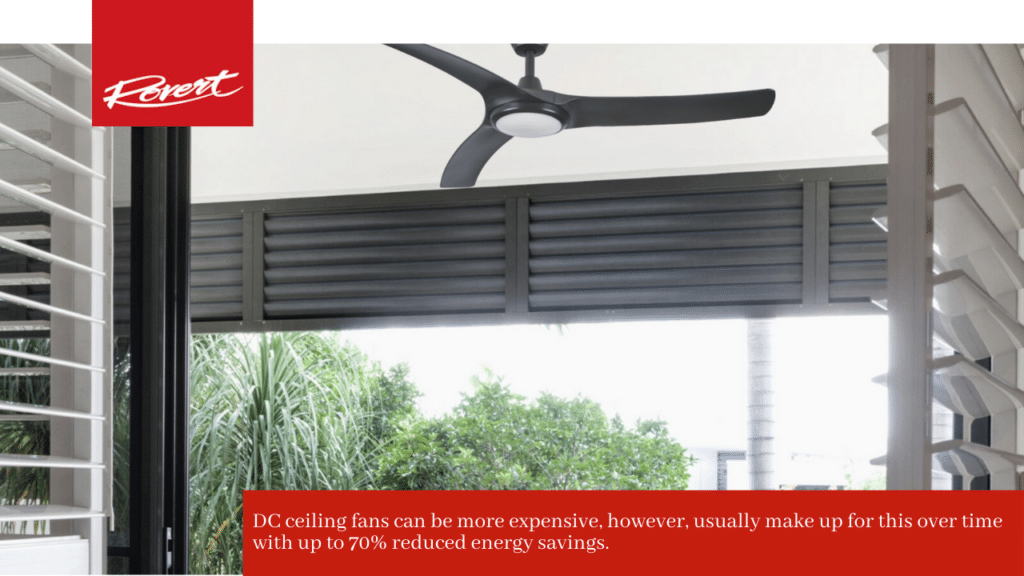
Shop the best price on ceiling fans with our lowest fan price guarantee!
Shop the best price on ceiling fans with our lowest fan price guarantee!
To NSW, ACT & VIC, and metro QLD & SA*
If you find a lower price, we’ll match it!
Sign up for exclusive VIP discounts all year round!
DC ceiling fans have risen in popularity over the last years, and more and more DC fans are being introduced to Australian customers. However, most consumers are not exactly aware of the differences between this newer DC motor, and the more traditional AC motor.
Do DC fans actually save energy and money spent on utility bills? How do they stack up against the AC fans in terms of technology, durability, and so on? These are just some of the questions that arise when comparing AC vs DC ceiling fans.
Alternate Current (or AC), is powered by an electrical charge with reverse flow direction. Direct Current (or DC), has a constant flow. Most household appliances use AC motors, and function by being connected directly to a power source.
For AC powered fans, the power source needs to create enough force to rotate the rotor of the fan motor. A DC powered fan, connects to a transformer which converts the AC power to DC, and then uses magnets to create the force needed to rotate the motor’s rotor. The result is a reduced amount of force needed directly from the power source to rotate the rotor of the ceiling fan motor.

Technical details aside, what do these definitions translate to when considering the purchase of an AC or DC ceiling fan?
For DC ceiling fans, the advantages include:
Less power
DC fans don’t use as much energy (up to 70% less) to run and produce the same output as compared to a similar capacity AC fan. This can lead to significant savings in utility bills especially in commercial settings like offices, shops, and restaurants where the fans can be running all day long.
Quieter
DC fans are much quieter than their AC counterparts. They use a newer type (sin180) of electronically commutated motor (ECM) that makes ceiling fans efficient and extremely quiet machines. Due to this advantage, they are preferred in setups where noise could be a nuisance like hospitals, libraries, schools and so on. A DC motor is also compact and light, so there is greater capacity for ceiling fans that are slimmer in design and lighter in weight.
More features
DC fans boast more features like remote controlled reverse motion, and faster reaction times to start, stop and change speed. This leads to more convenience and control in the hands of the users. By allowing greater control of the speed of the fan as per your requirement, the life of a ceiling fan can be significantly lengthened. Finally, there are select DC fans that come with intelligent motion control that allow smarter movement and distribution of air.
Some disadvantages to consider with DC ceiling fans include:
Expensive
DC fans can be significantly more expensive compared to the AC ceiling fan equivalents. You do, however, save on your utility bills and eventually, the costs can break-even.
Require an AC to DC converter
A DC fan should have an AC to DC converter either built in or installed externally to make them operate.

For AC ceiling fans, the advantages include:
Cheaper
AC fans tend to be much cheaper when compared to DC fans.
Durable
AC fans often don’t have the features of a DC fan, which works in their favour. They can quite often be easily repaired and are less prone to a lot of maintenance issues.
Easy operation
AC fans have an easy mechanism, generally controlled by a wall outlet, a pull cord, or remote, whereas, DC fans tend to be operated via remote control, which is easily misplaced or damaged. It should be noted, however, that a lot of the newer ranges of DC fans come with the option of adding a DC wall control, usually at an additional cost.
Reasonably energy efficient
While AC ceiling fans are not as energy efficient as DC ceiling fans, they are still an energy efficient and economical form of cooling.
There are many factors that will determine your choice of either AC or DC ceiling fan. Rovert Lighting & Electrical have an extensive range of AC and DC ceiling fans, and can help you choose the ceiling fan that’s right for your needs and for your budget.
Become a Rovert VIP to unlock exclusive savings & offers!
Shop VIP prices
PLUS save $10 on your first
online order over $100!
